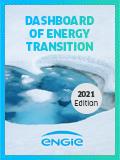The Dashboard is a reference document providing an annual overview of the energy situation in France and around the world, as well as decarbonisation and Climate policies throughout the world. It allows us optimise the support provided to our stakeholders to help them understand the energy transition and implement concrete actions.
Energy transition dashboard
What is the Dashboard?
For the past 10 years, we have been publishing “A World of Energy”, a report that assesses the energy situation in France and around the world over the previous year. The Energy transition dashboard follows suit, with the added element of advising and supporting our stakeholders on the energy transition (companies, investors, public authorities, employees and citizens). The first edition of the Dashboard was published in 2020 and mobilised many ENGIE experts.
It is a collection of reference quantitative information relating to the production and consumption of the different types of energy: oil, gas, coal, renewable energies. Alongside this objective data, drawn from the results of scientific studies from external and recognised sources and organisations, indicators concerning the progress of the energy transition have now been added. In particular, the Dashboard uses the Paris Climate Agreement (Cop 21) – aimed at keeping the global temperature increase to below 2°C compared to pre-industrial levels by 2100 – as its reference.
This essential analytical work is in line with our raison d’être, “act to accelerate the transition to a carbon-neutral economy” and our ambition to be an energy transition leader.
The 2021 edition of the Energy Transition Dashboard
The major trends over the past year include:
- the strong global economic recovery after 2020, in the midst of the Covid-19 pandemic. This resulted in a recovery in energy consumption, and created supply tensions and rising energy prices, especially for gas;
- the rebound in GHG emissions, slightly below pre-pandemic levels.
- the strong increase in the European carbon market, thus facilitating the energy transition towards renewable energy sources;
- the return of global energy investment to pre-pandemic levels, with a focus on clean energy;
- the strengthening of national and supranational energy transition commitments in Western countries with developed economies;
- the need to further engage local populations and communities in this movement by ensuring reliable electricity supply to consumers at a reasonable price, the latter being vital for societal acceptance.

